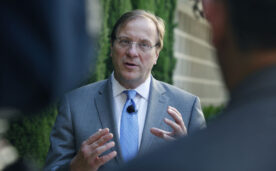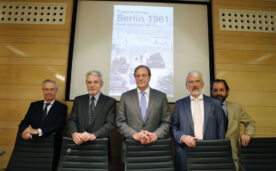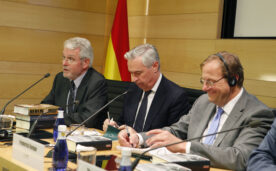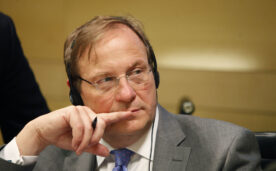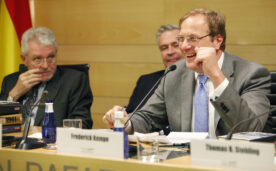On 29 May 2012, the Rafael del Pino Foundation hosted the presentation of the book "Berlin 1961. The most dangerous place in the world", published by Galaxia Gutemberg. Speakers at the event included: Charles Powell, Director of the Real Instituto Elcano; Thomas B. Stehling, Director of the Spain and Portugal Office of the Konrad Adenauer Foundation; and Frederick Kempe, President and Chief Executive Officer of the Atlantic Council and author of the work. The three took part in a debate moderated by Ramón Pérez-Maura, Deputy Director of the ABC newspaper.
Frederick Kempe stated that, "A book could be written today entitled "Berlin 2012". If "Berlin 1961" situates the height of Europe's divisions, Berlin 2012 would focus on whether European construction is sustainable. The German capital was the scene where the Soviets and Americans settled their differences in 1961. Now it is the Germans who have the authority to make decisions. What I hope is that they have learned the lessons of history: the price Europe has paid to get to where it is today is enormous compared to the cost of maintaining this situation. I am not sure that Germany has learned that lesson. The answer to my doubt will come in the coming months.
Frederick Kempe compared the geopolitical situation today with that of 1961: "From an American point of view, the world of the 21st century is much less dangerous. The risk of a nuclear confrontation between superpowers is small. But the risk of increased violence is greater, the world is now a more complex place. For example, what is NATO for, what is its adversary, who does Europe want to protect itself from with its security strategy? The historical moment covered in the book was, of course, much more dangerous, but also much simpler. Today, the balance is the opposite and the world is less dangerous, but also much more complex [...]. As President of the Atlantic Council, I think the idea of the transatlantic link is at risk. We are not talking about a geographical concept, but an ideological one: human rights, civil society, the rule of law... We live in the moment of the greatest geopolitical reordering since the 18th century, but we also live with the risk that the change also takes place in the world of values, that there is an anti-democratic tide, against the free market and against the rule of law. So we at the Atlantic Council believe that the international community needs to regroup around the ideas of the free world. And this is not just confined to the transatlantic area.
